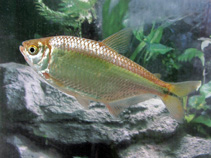| Family: |
Characidae (Characins; tetras), subfamily: Stethaprioninae |
| Max. size: |
7.5 cm SL (male/unsexed); 12 cm SL (female) |
| Environment: |
benthopelagic; freshwater; brackish |
| Distribution: |
Central America: lower Rio Papaloapan and Colima, Mexico south to some places in Central America (Ref. 30499), extending to the Rio Cocle del Norte and Rio Tabasara in Panama (Ref. 36880). |
| Diagnosis: |
Differs from A. nasutus and A. orthodus by its distinct humeral blotch and intermediate body depth. Sides and belly silvery over pearl white merging to a greenish brown back; in preserved specimens, a gray band runs from the humeral mark to the caudal peduncle which has a jet black rhomboidal mark extending to the tip of the middle caudal rays; transparent fins with minimal dark pigment; usually first rays of anal and sometimes dorsal and caudal fins with red or yellow pigment (Ref. 36880). |
| Biology: |
Inhabits all types of rivers and streams, from swift water to swamps and stagnant pools (Ref. 36880). Tolerates brackish water at sea level to small mountain brooks at 1000 m elevation (Ref. 36880). Forms schools over any type of substrate (Ref. 36880). Feeds on algae, seeds, leaves, aquatic and terrestrial insects and fish fry of any species (Ref. 36880). Spawns during most of the year at some sites or seasonally in other places (Ref. 36880). |
| IUCN Red List Status: |
Least Concern (LC); Date assessed: 19 September 2018 Ref. (130435)
|
| Threat to humans: |
harmless |
Source and more info: www.fishbase.org. For personal, classroom, and other internal use only. Not for publication.
